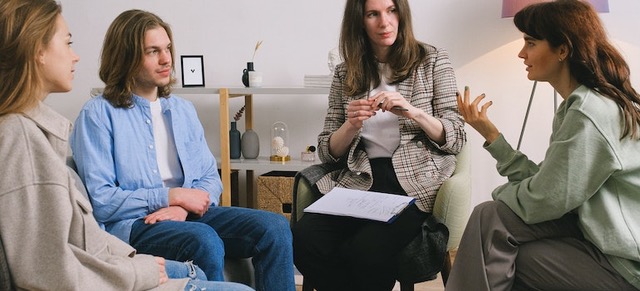Every relationship is unique in its way. But, some relationships are stressful and harmful. People feel stressed or unhappy even though they can’t tell why. So, what is the reason? In many cases, the reason lies in dependency on the other person. It can happen with anyone close to you – a family member, friend, or partner. Codependency harms both our mental and physical health.
What’s more, it creates harmful dynamics between people who love each other. But, once you understand it and want to change, there are ways to do so. Overcoming codependency in relationships through therapy will help you how to live a healthier and happier life.
But first, what is codependency?
Codependency is a relationship dynamic involving unhealthy preoccupation and dependence on another person. It happens when an individual neglects their needs and over-relies on another person. Because of that, they find it hard to define themselves outside of the relationship.
It used to be called ‘relationship addiction.’ That’s because, at first, the term codependency referred to families with substance abuse. Therapy’s goal was (and still is) to help everyone in the family work through recovery. Through therapy, family members learn to build healthy, supportive relationships instead of encouraging or enabling addictive behaviour. Rebuilding your life after addiction recovery is challenging, and family and friends play a vital role in it.
However, there are many other types of codependent relationships. The term also refers to emotionally destructive, one-sided, or abusive relationships. Sometimes, parents have too much control over their children’s lives. This may happen even when their kids are adults and should live their lives independently.
Or, a person may find themselves doing everything their partner wants. Working hard to please them leads to neglecting their wishes or needs. The same may happen in friendships, too. You may find yourself constantly doing what the other person wants. Or, you’re uncomfortable about their possible reaction to expressing yourself. Either way, it signifies that you might be in a codependent relationship.

There are many different types of dependent relationships
What are the signs of codependency?
So, how do you know you’re in such a relationship? What does it truly look like? These signs will show you whether you have a strong, healthy relationship or not.
Low self-esteem
A dependent person often doesn’t think well of themselves. They may constantly worry about what others may think. Or they may repress their true feelings in fear that others will react negatively. All of that leads to a lack of feeling self-worth and confidence to make their own choices.
Poor communication
Expressing what we want and how we feel should come naturally in a healthy relationship. Even negative emotions can be overcome and worked through if we are honest and communicate well. It may seem easier and safer to ‘go with the flow’ and follow another person’s lead. But, in the long run, not showing your true feelings may lead to mutual resentment, anxiety, stress, and depression.
Neglecting your self-care
Doing more than their own share all the time can cause a person to neglect their own needs and health. We all need balance in our lives. And the time we devote to doing what’s good for ourselves is vital for our mental, emotional, and physical well-being.

Do you always feel tired and anxious about others’ needs?
The anxiety of making choices on your own
Making important decisions about one’s life, career, etc., is stressful for everyone. For example, moving to a different province is a significant event in one’s life. Naturally, there are many things to keep in mind. Such things include housing or career options in your new place. But you shouldn’t be anxious and worried about how your parents or friends will react or manage without you. So, if you find yourself paralyzed by fear when making the smallest choices, let alone the important ones, it’s a sign of a problematic relationship.
Other signs that it’s time for overcoming codependency in relationships
There are many other signs of a codependent relationship:
- experiencing difficulty in saying no
- difficulty in setting boundaries
- putting others’ needs at the expense of your own all the time
- fear of being your true self around the other person
- feeling the constant need for approval and recognition
- feeling overly responsible for other person’s actions and well-being, etc.
Overcoming codependency in relationships through therapy
Some unhealthy relationships are truly toxic and even dangerous. However, in many cases, people aren’t even aware that their relationship is codependent. They truly love each other and want to be supportive and show that love. In such cases, therapy can help you identify harmful behaviours and change them. There are different types of therapy that can enable you to do that.
Group therapy
The first benefit of group therapy is that it shows you you’re not alone. What you’re going through isn’t uncommon. Group therapy creates a dynamic where people share their experiences and provide support for each other. Not only will you get positive feedback, but you’ll feel more accountable.
Some group therapies involve learning cognitive behaviour strategies, while some follow a 12-step model.

Overcoming codependency in relationships through group therapy is a good idea
Family therapy
This type of therapy is targeted toward dysfunctional family relationships. In codependent family dynamics, people often don’t discuss their issues, problems, and feelings. Family therapy enables them to do exactly that. The main goal is to improve communication and understanding among family members.
Cognitive therapy
Cognitive therapy focuses on changing your own habits, views, and behaviours. It enables you to recognize harmful patterns. And it also helps you become more aware of what you feel, want, and need. That way, you can grow as a person, become your full self, and create positive changes in your life.
Don’t be afraid to put your needs and desires first
A lot of people think that true love is selfless. Taking care of the other person and putting their needs first is love. That is true, but it’s not the whole truth. Taking care of yourself and expressing your feelings isn’t the opposite of love. It’s not being selfish. On the contrary, it’s vital to love yourself and practice self-care. Not only is it vital for your well-being but also for forming happy and healthy relationships with others.
The bottom line
Overcoming codependency in relationships can be difficult. The first step is to realize there is a problem. And therapy can help you work through these issues. Although it’s demanding to confront your feelings and behaviours, it is also rewarding. It helps you to truly be who you are and enjoy mutually healthy, joyful relationships.